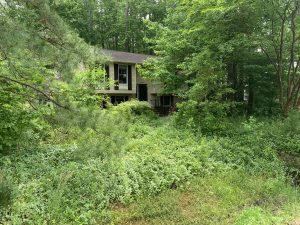
The Ocean Pines board updated resolutions to address violations to HOA rules such as unruly landscaping during their November board meeting.
Resolutions outline rights, authority and enforcement
By Cindy Hoffman, Staff Writer
(Nov. 23, 2023) The Ocean Pines Association Board of Directors approved two resolutions to conform with the Maryland HOA Act related to Architectural Review Committee guidelines. The changes related to the workings of the committee and enforcement/notification of homeowners about violations.
Director Jeff Heavner noted that the board streamlined the process and moved some responsibilities from the ARC to the board of directors.
“The board is required in our DR (Declaration of Restrictions) to be responsible for enacting any and all punitive actions to homeowners. This includes loss of amenities and/or all costs to clean up a property due to failure of a homeowner to remedy a violation,” Director Elaine Brady said.
“This had always been the case until about four to five years ago, when a board put those responsibilities on Operations and ARC.We are now simply ensuring those actions taken are in keeping with our DR requirements.”
OPA’s lawyer, Bruce Bright of Ayers, Jenkins, Gordy and Almond, cleaned up the process of notifications and board actions to make timelines more clear, along with adding information for giving homeowners the right, if they wish, to request a hearing in front of the board before any punitive actions may be taken, as is now required by the MD HOA Act.
Director Steve Jacobs requested an amendment to the enforcement resolution that when a notice goes out to the lot owner, that individual is informed of the right to be accompanied by someone in the presentation to the board if a hearing takes place. He also suggested lot owners would have the right to a closed meeting.
He said that person could be a lawyer, an advisor, translator or anyone else needed to assist the lot owner in the hearing.
Bright said the language Jacobs proposed suggests some discretion or choice on an open or closed hearing, which he did not believe there to be and would be a violation of the law. He noted that as far as having someone other than a lawyer, it was not a right of the lot owner and goes beyond what the statute contemplates.
“But if because of disability or language limitations, the violator needs the assistance, that can be dealt with on a case-by-case basis.”
Bright said the hearings should be open. “The board could go into closed session to obtain legal advice during the hearing, if necessary.”
He also provided an example of a lot owner having a health issue that was the reason for the violation. He said these can be dealt with as the case moves to a hearing.
The Jacobs amendment was rejected by the board based on the advice of Bright.
